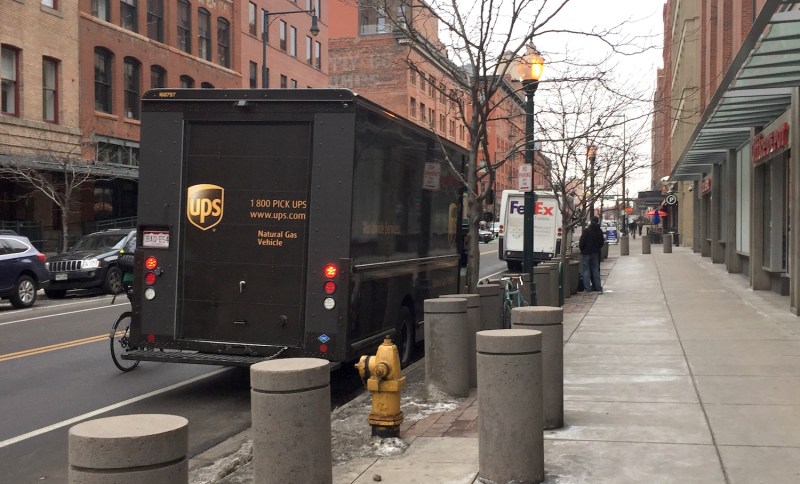FedEx, UPS Don’t Seem to Care About Blocking Denver Bike Lanes. What Can Be Done?

Streetsblog has posted a ton of pictures of drivers parking in bike lanes. Some of the worst offenders are companies like FedEx, UPS, and other delivery businesses that block bike lanes daily.
We recently contacted FedEx and UPS to see if they’re doing anything to clean up their act in Denver bike lanes. Are the even aware that they’re part of the problem?
Here’s what FedEx spokesperson Davina Cole told Streetsblog via email:
“We expect our couriers and drivers to abide by all traffic laws during the course of providing services to our customers and address any violations that occur. Parking in congested city locations can be a challenge, but we work hard to abide by local parking ordinances and to ensure we meet any citation obligation.”
Not a whole lot to go on. Cole did not respond to a follow-up query about how, specifically, FedEx “works hard” to obey traffic laws.
In a phone call, UPS spokesperson Matthew O’Connor also said that company policy is to not break laws.
“Our drivers are trained to follow local, state, and federal traffic laws, as well as any other laws,” O’Connor said. “So if there is not a parking space in front of a customer where they would be making a delivery or pickup, then instead of using say, a bike lane or a handicapped parking place, they need to — they’re trained to — find the closest parking space that they can legally park in to make that delivery or pickup.”
But in practice, that’s not what delivery drivers do.
I work on Wynkoop Street, where UPS and FedEx drivers routinely block the bikeway, usually multiple times a day. In that case, O’Connor said, people should report each instance and the national office would relay the message to the Denver office, which should follow up. After reporting the problem to UPS twice, I was told twice that a local team would follow up. No one ever did.
Something’s gotta give in a city with a growing number of people and limited street space. Protected bike lanes that physically deter drivers are certainly failsafe measures. But don’t expect 100 percent adoption any time soon.
More protected bike lanes with physical barriers would obviously help, but there are other steps the city could pursue as well.
Alyssa Alt works on curbside management for Denver Public Works. She says the streets department is working on policy solutions including: funneling delivery drivers into alleys, encouraging deliveries during less busy times of day, turning curbside metered parking spots into loading zones at certain hours, and incentivizing deliveries by bike and other small vehicles.
Eventually, she thinks tech could help drivers see where loading zones are open in real time, which could lead to some type of daily schedule.
“I think what it comes down to is that the delivery drivers want to be as close as possible to the place that they’re going, and they think that they’re going to be faster,” she said. “At the same time, I don’t think anybody should have the expectation that you’re always gonna be able to go to the front door of the building to deliver your things,” she said.
Freight companies are talking about fixes, Alt said, because it’s in their best interest as well as the city’s. San Francisco reserves much of its metered parking supply for commercial loading, for instance, giving freight companies the curb space they need [PDF].
The city’s policy recommendations will be included in an update of the Downtown Multimodal Access Plan. In the meantime, there’s nothing stopping freight companies like FedEx and UPS from getting their drivers to consistently park in alleys and loading zones instead of ruining Denver’s bike lanes.


